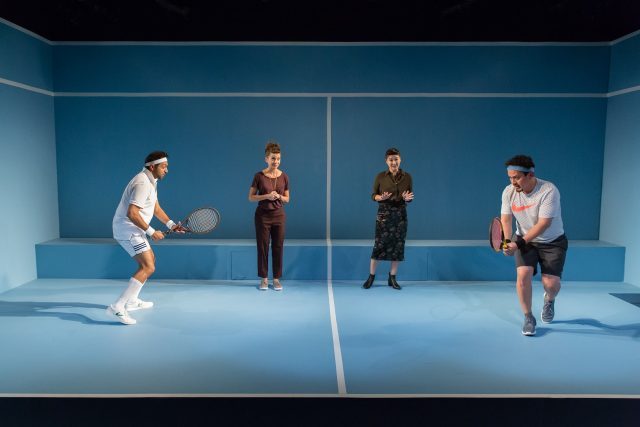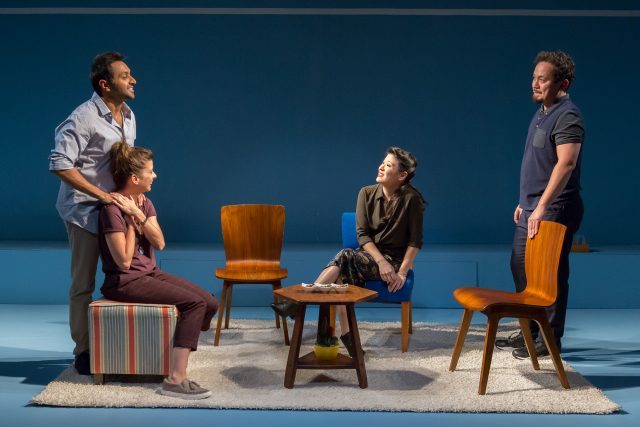
The game of tennis becomes a metaphor for life in DON’T YOU F**KING SAY A WORD (photo by Hunter Canning)
59E59 Theaters
59 East 59th St. between Park & Madison Aves.
Tuesday – Sunday through December 4, $35
212-279-4200
www.59e59.org
Some tennis matches are nonstop exciting events, thrill-a-minute delights with the final outcome constantly in doubt; think Roger Federer vs. Andy Roddick in the 2009 Wimbledon final, Jimmy Connors against John McEnroe in the 1980 U.S. Open semifinals, or Venus and Serena Williams going at it in the 2008 U.S. Open quarterfinals. Then there are the dull, decidedly one-sided affairs that you can’t wait to end, noncompetitive matches that practically put you to sleep. Andy Bragen’s Don’t You F**king Say a Word, with a title worthy of a McEnroe tantrum, falls somewhere in between. Taking place on Amy Rubin’s makeshift, condensed blue tennis court, the eighty-minute play is about the interaction between two couples, centered around the sport that dates back to the Middle Ages. One afternoon, former college classmates Kate (Jennifer Lim) and Leslie (Jeanine Serralles) bump into each other at the public Brian Watkins Tennis Center on the Lower East Side, where their significant others often play; Leslie’s boyfriend, Brian (Bhavesh Patel), is all about style, while Kate’s partner, Russ (Michael Braun), has a gruffer but no less competitive nature. Both men want to win, every time out. Meanwhile, the women address the audience directly, offering a “postmortem” on a major fight that Brian and Russ got into on the tennis court that serves as the impetus for the story. “Maybe along the way we’ll make some kind of discoveries. About boyfriends. Or husbands,” Leslie says. “Or men in general,” Kate adds as they seek to uncover “the deep wells that drive men forward — to the office, to the track, to the fields of war, to the fields of sport.” As the women talk about Russ and Brian as if they’re not there, the two men keep playing tennis around them, voguing into position as they prepare to serve, hit a cross-court shot, or head to the net for a put-away.

Two couples attempt to solve some personal issues on and off the court in tennis-based play (photo by Hunter Canning)
Bragen (This Is My Office, The Hairy Dutchman) and director Lee Sunday Evans (Caught, Wellesley Girl) try to make the play answer some major questions about contemporary American society, but the play works best when it is at its simplest, just depicting two competitive guys who might or might not actually be friends. “We Americans read so much into winning,” Leslie says. “It’s character. It’s will. It’s that little extra something. Or is it luck or chance? Fate?” Kate responds. Leslie: “Everyone likes to win. Men in particular.” Kate: “And when they don’t . . .” Leslie: “. . . it can become a much bigger deal than it should.” Just at that moment, Russ shouts out “Goddamnit!” as he loses a point to Brian as if it’s the end of the world. Some of the staging involving the tennis game is inventive (yet repetitive), but the play never achieves that nail-biting, back-and-forth verbal volleying it aspires to. Occasionally there’s a rousing smash or a stirring forehand, but not nearly enough to lift it out of being much more than a pleasant diversion with some neat insight that doesn’t effectively challenge the audience when it should. Perhaps it needed more Andre Agassi and Connors and less Novak Djokovic and Kim Clijsters to lead it into the later rounds, as slow and steady is not always the best way to win over an audience, onstage or on court.